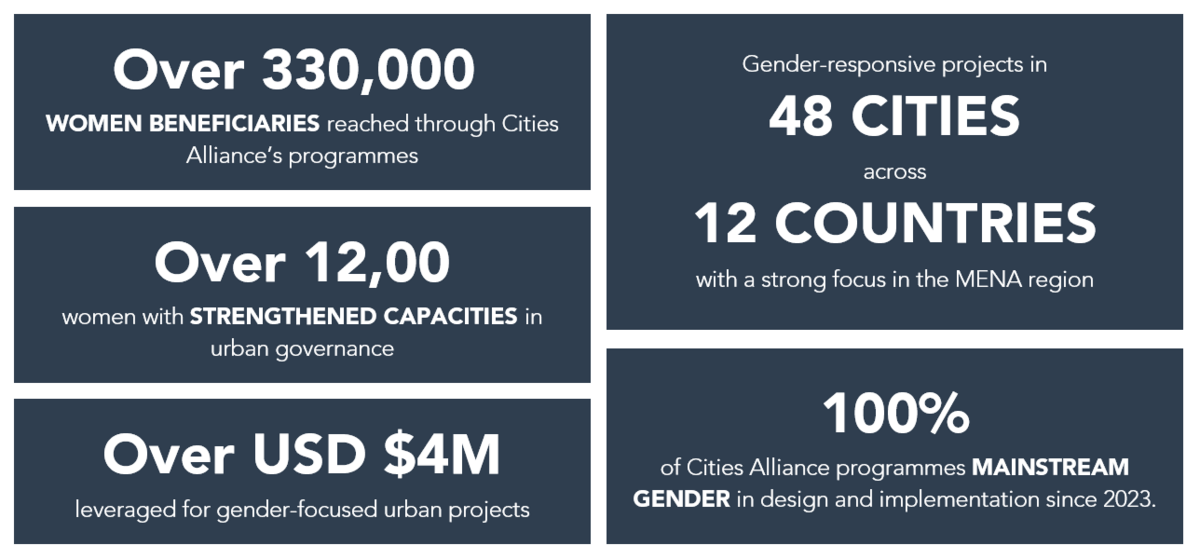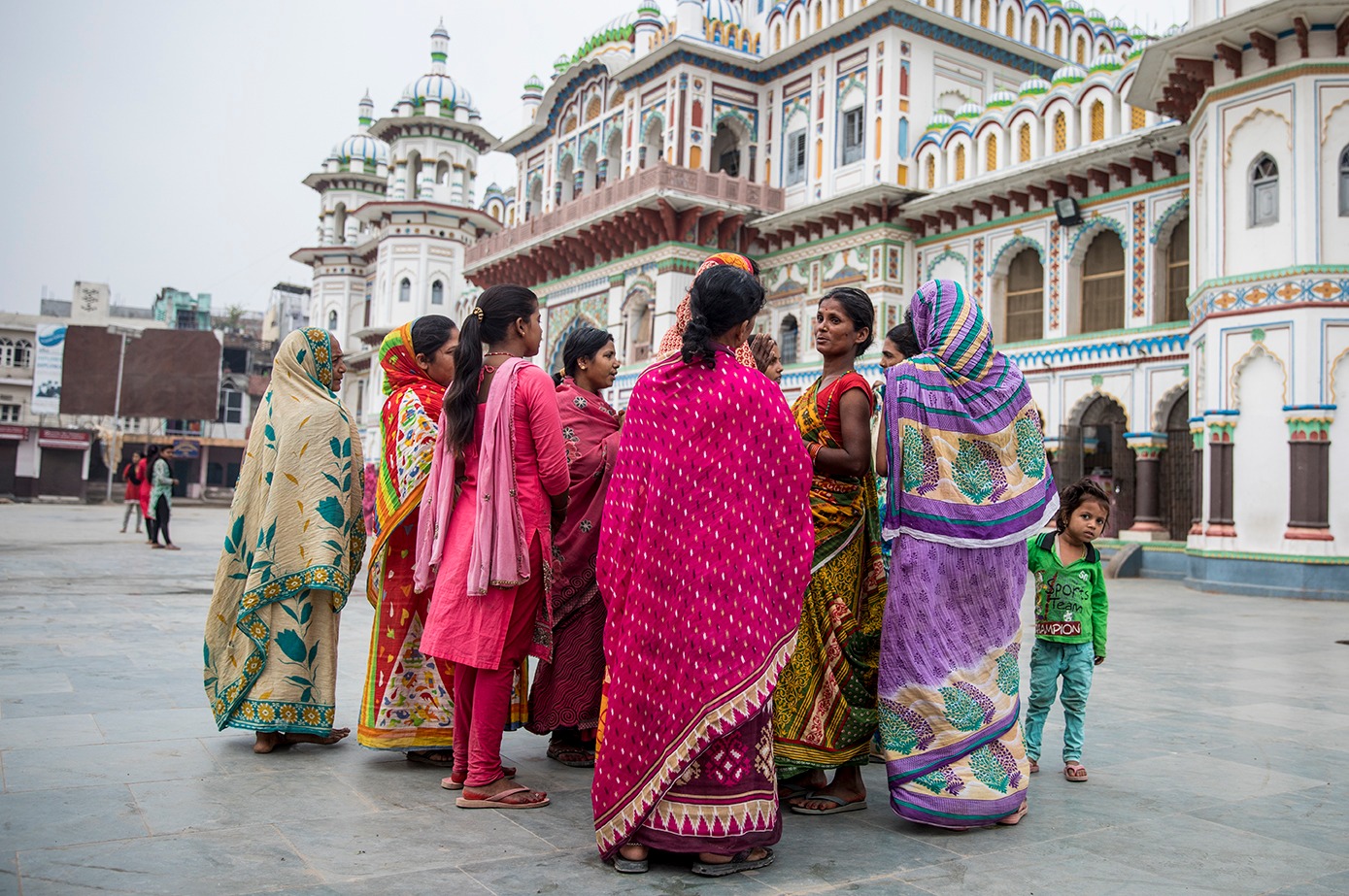Results
Over the past four years, Cities Alliance has strengthened its commitment to gender equality by delivering concrete results - from developing and applying gender-responsive tools to mainstreaming women’s empowerment across programmes, policies, and partnerships - firmly embedding inclusion at the core of urban development.
Key results (2022–2024)
In the current strategic period, Cities Alliance's work has delivered results across multiple levels of intervention:

Strategic Priorities and Programme Outcomes
As cities face increasing climate-related hazards, women and girls bear the brunt of climate impacts as the crisis deepens existing vulnerabilities. To face this challenge, Cities Alliance has developed and tested a set of tools including Her4Climate, Her4Water, Her4Energy, and Her4WEFE to assess and track women’s needs and strengthen their engagement in climate-resilient governance.
The application of the Her4Water tool [...] made it possible to collect diverse and high-quality data, the analysis and processing of which led to results that formed the basis for assessing the risks and challenges faced by these women and girls regarding access to and governance of water.
Placing women at the centre of climate adaptation decision-making has led to the following results:
- The Cities4Women programme in Nepal influences national urban policies to be more climate resilient and inclusive. A first phase of prioritisation deployed the Her4Climate tool in 10 cities, 6 of which were selected for intervention. A further 600 individuals were engaged to assess climate risks and identify nature-based solutions for new public spaces in the selected cities.
- Over 1,000 community members engaged through the Women and Sustainable Cities regional programme to strengthen gender-sensitive water governance and rehabilitate water infrastructure, including a new women-managed water kiosk in Sebkha, Mauritania.
- The success of the Her4Climate tool led to Canada funding a climate resilience component of the Femmedina programme.
- Previously, 3 women organizations were funded to support grassroot, locally-tailored climate adaptation initiatives and empower marginalized groups in the Innovation programme.
Public spaces are a key component of Cities Alliance gender strategy as they can be entry points for transformative change to address systemic gender inequalities. Participatory processes such as co-designing workshops and the Women’s Engagement in Cities (WEC) framework are crucial to collect qualitative gender-dissagregated data and address specific needs of women and girls such as safety, accessibility, and economic empowerment. In recent years, the following achievements have been made in fostering safer, more inclusive public spaces:
- Following a gender assessment mobilising over 150 individuals and training a dozen municipal staff, the Femmedina programme intervened in 7 public spaces in the Tunis medina benefitting over 1,500 women. The programme was expanded to 4 additional Tunisian cities in which the WEC framework was deployed to inform gender-sensitive public space design. 5 practical urban planning guides were subsequently adopted by each municipality prior to spatial interventions in 2025.
- Gender-sensitive diagnostics were conducted in Haiti to respond to the needs of public market users which are predominantly women.
- Across all gender programmes and global training programmes, over 1,500 individuals received gender-sensitive planning capacities training.
Recognising the additional vulnerabilities of displacement-affected women face, Cities Alliance has recently embedded gender tools and analytical frameworks into its migration programming:
- Comprehensive gender analyses derived from the WEC framework were conducted within the Resilient Systems of Secondary Cities programme to ensure that the needs and perspectives of women and girls were fully integrated into the intervention design.
- Gender profiling was conducted during the Feasibility Study and Diagnostics phase of the SUIDAC programme and revealed specific vulnerabilities displacement-affected women faced both within migrant and host communities.
Women play a pivotal role in preserving and transmitting cultural heritage. As such Cities Alliance is reframing heritage as a driving force of gender equity, climate resilience and inclusive urban development - particularly in the MENA region.
- With UNEP and UNESCO, co-organised a workshop to highlight the opportunities of heritage-based climate adaptation in low-income urban areas. This resulted in the joint publication Back to the Future, showcased on major international platforms including the Paris Global Forum on Heritage and WUF12.
- The Women and Sustainable Cities regional programme is rehabilitating traditional water systems - majels in Kairouan, Tunisia and the UNESCO listed irrigation system of the oasis city of Figuig, Morocco - as climate resilient solutions to drought.
- A workshop held in Madaba, Jordan mobilised 40 local stakeholders highlighting economic gender inequalities in the tourism and handicraft sector and the opportunities of involving women in the tourism and handicraft sectors. Subsequently, funds were leveraged to launch the Her4Heritage programme.
Over the past years, Cities Alliance has emerged as a trusted global voice and strategic partner in advancing gender equality in urban development. By combining high-impact knowledge production with targeted advocacy, the organization has helped shape inclusive policy agendas and catalyze action at both global and local levels.
- Produced over 100 knowledge products that are influencing urban policy, planning, and investment with a gender lens.
- Developed 7 practical, gender-responsive tools to enable data-driven, participatory planning for inclusive cities.
- Convened over 170 advocacy and knowledge-sharing events, including 27 high-visibility engagements at major platforms such as COP and the World Urban Forum—driving visibility, stakeholder alignment, and policy influence.
This work has positioned Cities Alliance as a leader in the field, delivering measurable results and offering donors a high-leverage opportunity to invest in systems-level change for gender-inclusive urban futures.

